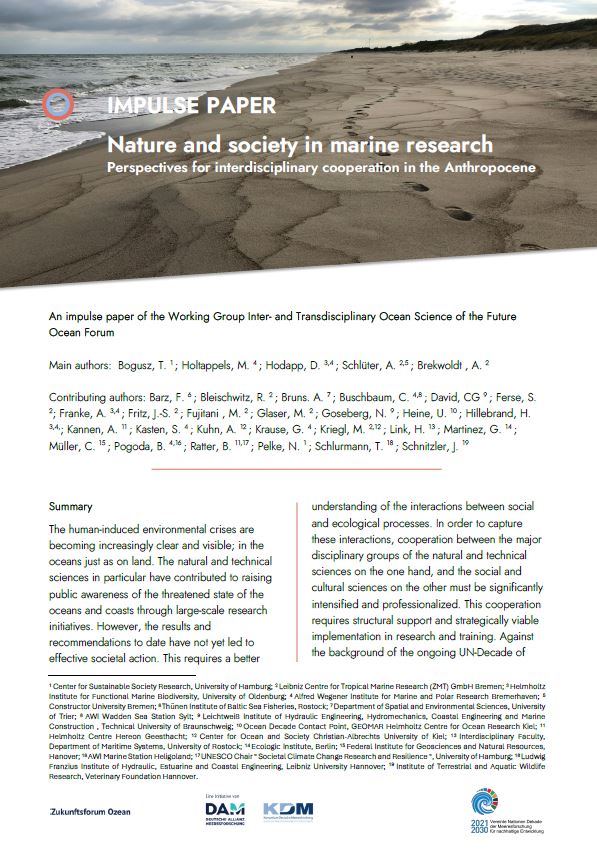Nature and Society in Marine Research
Perspectives for interdisciplinary cooperation in the Anthropocene
- Publication
- Citation
Bogusz, T., Holtappels, M., Hodapp, D., Schlüter, A., & Breckwoldt, A. (2024). Nature and society in marine research - Perspectives for interdisciplinary cooperation in the Anthropocene. Zenodo. https://doi.org/10.5281/zenodo.14887580
The environmental crises caused by humans do not stop at the oceans. To effectively tackle these complex challenges, new forms of scientific cooperation are needed. This impulse paper argues in favour of strategically strengthened cooperation between the natural, technical, social and cultural sciences. It presents five key areas of development that should pave the way for more socially relevant marine research in the future - from reforms in education to structural outreach to society. Dr Grit Martinez from the Ecologic Institute, who has been committed to combining social science and humanities perspectives and environmental research for many years, contributed to this impulse paper.
Connecting scientific cultures
A central concern of the paper is the creation of connectivity between different academic cultures. Natural and technical sciences contribute decisive databases and systemic understanding, while social and cultural sciences highlight social logics of action, value issues and perspectives. The combination of these perspectives is essential in order to holistically understand the causes and effects of marine environmental changes - and to develop concrete solutions. Interdisciplinarity is not understood as a mere mixture of methods, but as reflected co-operation on an equal footing.
Professionalisation through qualification and support
The qualification of future researchers should specifically prepare them for interdisciplinary challenges. The paper calls for reforms that lay the foundations for long-term and professional collaboration as early as the academic qualification stage - even beyond traditional academic careers. Funding structures are also needed that not only allow such collaborations, but actively facilitate them: through suitable calls for proposals, budgeting for joint initiation phases and interdisciplinary review panels.
Rethinking institutional structures
In addition to professional training, the focus is also on marine research organisations themselves. In order to anchor interdisciplinary cooperation in the long term, competences for cooperation should be specifically developed within research institutions. This structural strengthening not only promotes internal projects, but also transdisciplinary cooperation with stakeholders from civil society, administration and business. The aim is to jointly develop knowledge for action that is socially relevant - in the sense of science that provides impetus for transformation.
On the path to interdisciplinary excellence
The paper makes it clear that interdisciplinary marine research is more than just a methodological balancing act - it is a central building block for effective science in the Anthropocene. It requires new evaluation mechanisms that fulfil the special requirements of such cooperation, as well as targeted investments in scientific cooperation cultures. So that science not only produces knowledge, but also contributes to overcoming the marine crises of our time together with society.




